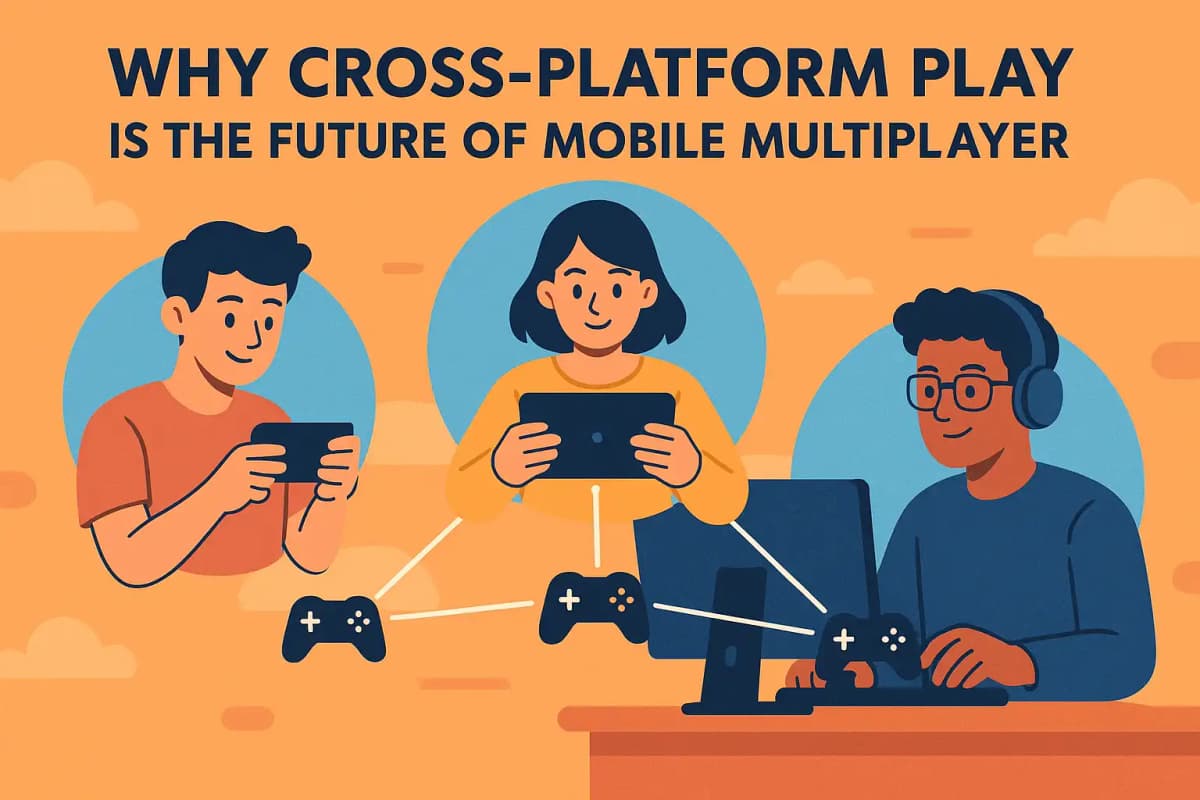
Cross-platform play is rapidly transforming mobile multiplayer gaming from a fragmented ecosystem into a unified, borderless experience. As games like Fortnite and Call of Duty Mobile demonstrate the power of seamless PC-mobile integration, the industry is witnessing a fundamental shift in how players connect, compete, and engage across devices. This technological convergence isn’t just enhancing gameplay, it’s reshaping the entire competitive gaming sphere.
The evolution mirrors broader trends across digital entertainment. Much like how the online casino industry has embraced cross-platform compatibility, with operators like Action Network offering seamless transitions between desktop and mobile gaming experiences as well as various bonuses, multiplayer gaming is breaking down traditional platform barriers. This convergence reflects changing consumer expectations for flexibility and accessibility, whether placing a bet on a mobile casino app or dropping into a Battle Royale match with friends across different devices.
The technical achievement of cross-platform play cannot be overstated. For years, gaming platforms operated as isolated ecosystems, with PlayStation, Xbox, PC, and mobile users unable to connect. Games like Fortnite shattered these walls when Epic Games introduced full cross-play across mobile, PC, and all major consoles in 2018, fundamentally changing player expectations. Call of Duty Mobile followed suit, creating bridges between its standalone mobile experience and console/PC counterparts through account syncing and cross-brand rewards.
This seamless integration works by unifying game servers, implementing platform-agnostic design, and employing advanced networking technologies that synchronize gameplay across vastly different hardware specifications. Players on Android devices can now squad up with friends on gaming PCs, all competing in the same virtual battleground without technical barriers impeding their experience.
The competitive gaming scene has experienced tremendous growth through cross-platform implementation. The most immediate advantage is drastically expanded player pools, which translates to faster matchmaking, better skill balancing, and more dynamic competitive environments. Instead of splitting communities by device, cross-play creates unified player bases that keep multiplayer ecosystems healthy and engaging for longer periods.
For esports specifically, cross-platform capability has elevated competitive potential by enabling unified tournaments and robust competitive ecosystems. Mobile esports titles like PUBG Mobile and Call of Duty Mobile have leveraged cross-play features to attract diverse audiences and extend their competitive lifespans. The technology also supports better revenue generation through larger player bases, creating more opportunities for in-game purchases, cosmetics, and season passes.
Player freedom represents another significant benefit. Gamers no longer need to purchase the same hardware as their friends to play together. Whether using a PlayStation, gaming rig, or smartphone, players can connect without compatibility concerns. This inclusivity has opened mobile gaming to broader demographics, with cross-platform functionality becoming an expected feature rather than a novelty.
Despite these advantages, cross-platform play introduces notable challenges, particularly regarding competitive balance. The most contentious issue involves matchmaking imbalances created by hardware and input disparities. Mobile players using touchscreen controls often face significant disadvantages when matched against PC players wielding keyboard and mouse setups, who enjoy superior aiming precision and higher frame rates.
Fortnite exemplifies this dilemma. While the game pioneered cross-play adoption, mobile and Nintendo Switch players cannot disable cross-platform matchmaking, forcing them into lobbies with PC players despite running at 30 FPS against opponents achieving 120+ FPS. Although Epic Games implements skill-based matchmaking to mitigate these disparities, the fundamental hardware advantages remain. PC players benefit from better input devices, higher performance, and enhanced visual clarity—creating an uneven playing field that frustrates mobile-only competitors.
The situation worsens when considering that mobile gaming encompasses a wide performance spectrum. High-end devices like iPad Pros deliver experiences closer to PC gaming with elevated frame rates, while budget smartphones struggle with basic performance. Even with cross-play disabled—where that option exists—mobile players face internal imbalances between premium and standard devices.
The best cross-platform mobile multiplayer games successfully balance accessibility with competitive integrity. Fortnite remains the gold standard, supporting cross-play across more platforms than any competitor, though its forced crossplay for certain devices remains controversial. Call of Duty Mobile has created effective bridges between mobile and broader franchise ecosystems, offering ranked playlists and diverse multiplayer modes that work across platforms.
Other standout titles include Apex Legends, which implemented cross-platform features at launch and maintains strong communities across PlayStation, Xbox, PC, and Nintendo Switch. Rocket League continues demonstrating that competitive games can handle mixed-platform play without breaking experiences, offering high skill ceilings while remaining accessible. These games share common traits: robust matchmaking algorithms, optional cross-play filters, and continuous balancing efforts to address hardware disparities.
Cross-platform play represents the inevitable future of mobile multiplayer gaming. As 5G networks expand and mobile hardware becomes increasingly powerful, the technical barriers between platforms will continue dissolving. The challenge for developers lies in implementing cross-play thoughtfully—providing player choice, addressing matchmaking imbalances, and ensuring competitive fairness across different input methods and hardware capabilities.
The convergence extends beyond gaming into broader digital entertainment trends, where seamless multi-device experiences have become consumer expectations. As the mobile gaming market continues expanding, with approximately 80% of online players now primarily using smartphones, cross-platform compatibility shifts from competitive advantage to operational necessity.
The gaming industry stands at a crossroads where device boundaries are becoming obsolete. Cross-platform play doesn’t just connect players—it fundamentally reimagines what gaming communities can be when liberated from hardware constraints. For mobile multiplayer, the future isn’t about choosing between platforms; it’s about playing together, regardless of device.
Get access to exclusive strategies, hidden tips, and pro-level insights that we don't share publicly.
Ultimate Gaming Strategy Guide + Weekly Pro Tips